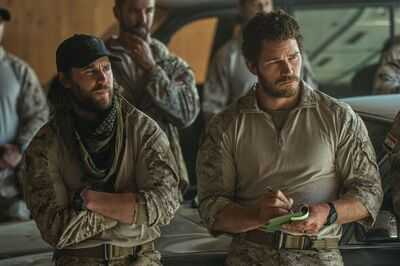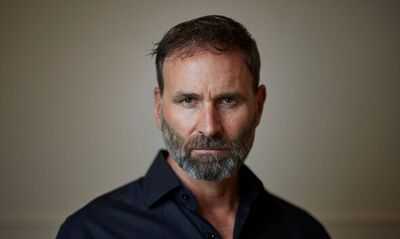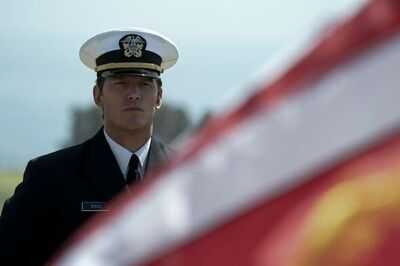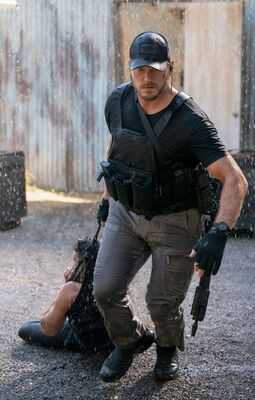
Former US Navy SEAL Jack Carr might just be the world's most exciting thriller writer - but he's certainly the hardest working. Since his 2018 debut The Terminal List reignited the conspiracy thriller genre, Carr has published another seven novels as well as co-authoring a book on the 1983 US Embassy bombing in Beirut that killed 220 marines.
Then there are the unmissable Amazon Prime adaptations and spin-offs. Guardians of the Galaxy's Chris Pratt starred as Carr's Lt Cdr James Reece, whose SEAL platoon is betrayed and ambushed during a covert operation in Syria before survivors are picked off one-by-one back in the US. As casualties mount, including Reece's wife and daughter, the elite operative goes rogue, wreaking bloody revenge on the shadowy big pharma and military-industrial complex figures who sold out his men.
The Terminal List topped global streaming charts in 2022 and a second season, True Believer, has just wrapped filming in Morocco while a prequel spin-off, Dark Wolf, starring Taylor Kitsch as Reece's CIA buddy Ben Edwards is currently riding high in the charts. Just listening to Carr is exhausting, but it's all part of a plan he explains over Zoom on his way home from Paris, where he managed a few days R&R with his wife ahead of a major publicity tour for his new novel, the Vietnam-era prequel Cry Havoc featuring Reece's father, Tom, of which more shortly.
Having planned on joining the military aged 11 - aiming to become an elite SEAL, despite the 80% attrition rate training for the US Navy's elite Sea, Air and Land teams - Carr aimed to become a bestselling author, number one on the prestigious New York Times bestsellers list with a TV adaption to boot, after leaving the front lines. Incredibly, he's achieved all three. But failure hasn't been part of his vocabulary.
"I just never wasted any bandwidth worrying about if I'd get into the military or write a novel or if it would be successful, or if it would be adapted for TV," explains Carr, whose paternal grandfather, a US Marines Corsair pilot, was killed in action at Gudalacanal in the closing months of the Second World War. "I just assumed those things would happen and put all my energy and effort in."
Is that a very SEAL thing to do, I wonder. "It's a very me thing to do," he chuckles.

There's no doubt the 50-something, who joined the US Navy in 1996 and served two decades in its elite Special Warfare Command, including tours of Iraq and Afghanistan, before retiring as a commander, is monumentally driven. But what really shines through Carr's books is the quality of his writing - creating propulsive, action-packed thrillers with a high level of authenticity. Growing up in northern California, his mother Caroline was a librarian and books were "like breathing".
"I've never been without a book since. I've never not built my library." His "professors in the art of storytelling" included iconic British writers like Ian Fleming, John le Carré, Freddie Forsyth, Ken Follett and their US counterparts Tom Clancy, Robert Ludlum and Rambo creator David Morrell among others.
"Reading really made all this possible, not just the writing, but everything I did in the SEAL teams because I'm also reading non-fiction," he says. "I'm reading everything I can find about warfare, specifically terrorism, counterterrorism, insurgencies, counterinsurgences. From an early age I knew the war of the future, my generation's war, was going to have some touchpoint with terrorism."
Carr became known for taking books on operations - 'downrange' as it's called in the SEALS. "If I was in the British military in the 1800s, I probably would have porters carrying big crates of books as we traversed into Afghanistan," he jokes. "Typically I had one thriller and one non-fiction on the go at any given time."
That reading, married to his real-life warzone experiences - he is a holder of the Bronze Star, the US military's fourth highest medal for bravery - helped build the authenticity of the books when he began writing.
"I got back from my last Iraq deployment in 2014 and decided that it was time to move on," he tells me. "I had a couple of years left to hit the 20-year mark and I was going to a training command. We call it BUDS - Basic Underwater Demolition/Seal training - as Operations Officer. So no longer responsible for taking people into Iraq or Afghanistan - that weight wasn't going to be there on my shoulders.
"I could take a breath, look around and think about next steps. I decided to get out, my family needed me. We have a middle child with severe special needs who needs 24/7 full time care. My wife had been dealing with that while I was in Iraq and Afghanistan and just focused on the mission and my friends and teammates to my right and left. So I decided it was time to get out and I knew what I was going to do - I'm gonna write - because I've known that since I was a little kid."
Based back in the US at Coronado, California, Carr began working on the book that would become The Terminal List. "I studied warfare academically and I'd put that into practice in Iraq and Afghanistan, so I could describe the feelings and emotions behind what it felt like to do these things and apply them to a fictional narrative."
Once the book was written. He just needed one more thing. Jack Carr is a pen-name, partly for security and thanks in part to the advice of Britain's thriller king Lee Child who the now soon-to-be ex military operative met in January 2016 shortly before The Terminal List was published.
He recalls: "The first thing Lee told me was 'I love your title, but you need a pen name'. When he was doing his own research, he realised 'Cs' were a good place for a writer - on the shelf next to Tom Clancy, Clive Cussler, Mary Higgins Clark, Patricia Cornwell... all these bestselling authors. So he advised me to choose a surname with a C so I'd be next to all those greats on the bookshelf. And I said, 'Yes, sir.'"
The book began to pick up fans fast and the Prime adaptation supercharged its popularity. In both book and on TV, Carr takes James Reece - who discovers he has a brain tumour, the result of experiments on the SEALS - to the edge of extremism.
In one instance, spoiler alert, he solves a de facto locked room conundrum - the baddies are holed up in an utterly impregnable space - by sending in one of their co-conspirators in a suicide vest. It's ballsy stuff, so did he ever think, 'Am I pushing my guy too far? Are readers going to lose sympathy?'
"I knew that I didn't want to ask those questions as I was writing," he admits. "Remember the voiceovers from 80s action movies that would say, 'He had nothing left to lose'? And I would always think, 'Well he's always got something to lose, he could die'. So I'm like 'How do I do, essentially, what the Samurai did back in feudal Japan when they would go into battle thinking they were already dead which made them more effective warriors?'
"Okay, a brain tumor caused by experiments from a conspiracy of pharmaceutical and government entities.


"That came from the Church Committee hearings of the 70s that exposed overreach by the CIA and the NSA. So there was some basis in history for testing drugs on soldiers, and also on mental institution patients and prisoners."
Indeed, as per a good conspiracy thriller, there's a fair bit of cynicism over the behaviour of the powers-that-be. Did the writing, I wonder, make Carr feel differently about his sense of patriotism? "I didn't go into the military with any illusions that somehow this war was going to be different and that people were going to act in the best interests of the nation, and the individual soldiers, sailors, airmen and marines they're sending downrange," he shrugs.
"I went in thinking, 'Hey, I'm going to do my duty, to prove myself in training, but then also on the field of battle, and do the best job I can for those I'm leading in the combat'."
Like Carr the man, Carr the writer is incredibly target-focussed. "My goal is always that this book be better than the last one," he says. "In the SEAL teams, I always wanted to be a better operator and leader today than yesterday. Personally, I want to be a better father and husband and citizen today and I certainly want to be a better writer today than yesterday."
Which brings us to Cry Havoc, featuring James Reece's father, Tom, a SEAL serving in Vietnam in 1968, a key year in the struggle, alongside local Montagnard mercenaries fighting with the US. Reece is a MACV-SOG operator - part of the innocuously named US Military Assistance Command Vietnam, Studies and Observations Group - tasked with taking the fight across the borders into Laos, Cambodia and North Vietnam.
Set against the backdrop of the Cold War and featuring real-life events and characters, Carr uses the capture of the USS Pueblo spy ship off the coast of North Korea along with its 83 crew members, one of whom was killed, in January 1968 to underpin his story.
Teams of seasoned operators are disappearing, feared ambushed, and killed or captured, as a Russian spy chief plays out his deadly games using the stolen US codes to humiliate America. Cry Havoc takes readers from the jungles to the flesh pots of Saigon, from Red Square to the White House and back. Writing it was a mammoth task.

"I thought I knew a lot about Vietnam and then I dove into the research and I realised, 'Oh, wow, I've just scratched the surface previously'," says Carr. "I wanted every sentence to be written through the lens of that time. So I had a dictionary from 1969 and maps from the 60s of Southeast Asia. I put so much work into writing every sentence without the benefit of 50-plus years of hindsight."
That authenticity bubbles through and fans of The Terminal List will enjoy seeing where James Reece came from. "But it took a lot longer than I planned. I have a whole plan for what to do with Tom but it took a lot out of me. All my heart and soul went into it so now I'm going back to James Reece next and I'll revisit his dad in the future."
Carr, unsurprisingly, is hands-on when it comes to the TV adaptations. "Especially now that I've learned so much over the last few years, I can add more value going forward. And the goal, once again, is to always do it better," he smiles. He credits the drama with fleshing out supporting characters like Ben Edwards "so much better than the character in the book".
"And then the way that Taylor elevated him on screen... he brought humanity, he brought this empathy, he really humanised that character."
Back in the real world, Carr is concerned about perceived witch hunts against former special forces soldiers but insists: "What's most important is to always maintain the moral high ground. And some of the things I talk about in the books are ceding that moral high ground and what happens when one does that.
"It can be devastating across the board because oftentimes that's the only thing you have that differentiates you from the enemy!"
Even with his game plan, sometimes I suspect Carr must pinch himself. "Mostly I feel extremely fortunate and extremely grateful to everyone who took a risk on me as a new author," he adds. "Which is why every single second I focus on writing is all about the books, in order to honour that readership."

Finally, I've got to ask, does he have a James Reece style mancave, and did he ever use tomahawks - Reece's close combat weapon of choice and his creator's logo - on operations?
"I've always had something like that and I love the care my friend Max Adams, who's a writer on the show and a former Army Ranger, took with setting the man cave up for the TV," he chuckles. As for the tomahawks, "I wish that I had so that I could tell you that I did. Some guys did, but I typically carried knives and I went as light as I possibly could.
"If I look at pictures of me from the beginning of the war to when I got out, you could see my gear gets more refined each and every deployment so that I could move a little better. Always working on that kit was very important to me.
"But in my retirement ceremony, I gave my kids four gifts; a Bible and an antique compass. And I said, 'These are to guide you'. I gave that leather bound copy of the US Constitution Bill of Rights, 'Here are our natural rights enshrined in these documents'. Then I handed them a Winkler tomahawk each and said, 'Here's the means to defend them'.
"The Tomahawks were already in the book and that came from just noting the importance of having a totem attached to a character, much like Sylvester Stallone did with Rambo. Stallone realised the importance of a totem and that became Rambo's survival knife that you unscrew the fishing line which is not in the book.
"I didn't just want to just do something similar, but have a different knife. I needed something that spoke to my character. David Morrell told me, 'Be a first-rate version of yourself and not the second-rate of another author'.
"The tomahawk's really an ancient type of a weapon but built with modern materials. So that's James Reece, a student of warfare, but living in contemporary time."
- Cry Havoc by Jack Carr (Simon & Schuster, £9.99) is out now
You may also like

Fugitive Rashid Cablewala, an aide of Hashim Baba, detained in Azerbaijan

16th judge, 2nd in 2 weeks, exits Chaturvedi case

MBBS student 'gang-raped' in West Bengal, friend held

Helicopter crashes in California's Huntington Beach; 5 injured - watch

X-factor for CXO jobs: Tackling turmoil, companies seek leaders skilled in managing disruption amid global uncertainty







